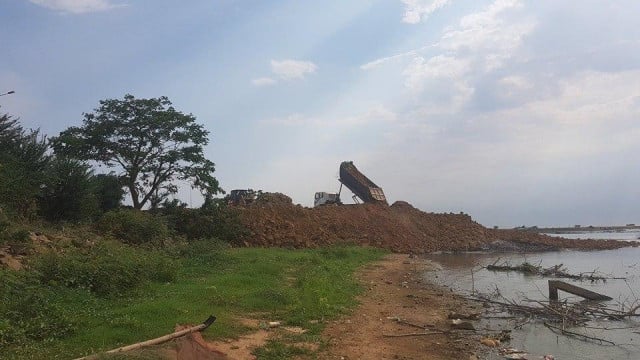Build Factory Nurseries and Kindergartens: PM

- By Lay Sopheavotey
- August 30, 2023 4:26 PM
PHNOM PENH – Prime Minister Hun Manet has urged ministries and local officials to cooperate with employers and workers to study the possibility of establishing community nurseries and kindergartens in factory areas.
Say Sokny, the vice president of Federation of Free Trade Union of Workers of the Kingdom of Cambodia (FTUWKC), welcomed the initiative, citing protections for women and young children in the Constitution and the Labor Law.
The PM said at a meeting with 18,000 workers in Phnom Penh on Aug. 29 that childcare facilities would aim to improve the efficiency of work performance and pay more attention to the welfare of mothers and babies.
Stakeholders, including the ministries Labour and Vocational Training, Women’s Affairs, and Education, Youth, and Sports, had to implement the policy within two years.
“We have to build kindergartens and nurseries at their workplaces, where mothers can drop their children. However, don’t build them next to the factories because the smoke will harm the babies’ health,” he said.
Officials must evaluate locations for the buildings to protect the mothers’ and babies’ health. As for the community kindergartens, the Prime Minister will focus on nutrition.
According to the Cambodia Demographic and Health Survey 2021-2022, the cases of mothers’ breastfeeding within the first hour of giving birth declined from 66 percent to 54 percent, while breastfeeding for the first six months also decreased from 74 percent to 50 percent.
In some workplaces, there are nursery rooms for breastfeeding while some other places have not taken it into consideration yet.
At the opening ceremony of the World Breastfeeding Week on Aug. 25, Health Ministry Secretary of State Prak Sophorneary said the policy that is favorable for workers by providing paid leave, enough days for the mothers who need to breastfeed their babies, and a breastfeeding room at workplaces will be beneficial for not only the women but also for employers.
The Prime Minister also set out a policy to improve the canteens or restaurants in factories. New factory buildings must include canteens for workers.
Manet called on officials to continue supporting safer forms of transport. If necessary, the means of transport should be changed.
He set a deadline of 2027 for the sub-national officials to complete the reform.
Say Sokny said the Constitution gave women the right to take maternity leave with full pay and with no loss of seniority or other social benefits.
The Labor Law said pregnancy and labor shall not interfere with a woman’s work and her chance to be a mother and an employee with understanding and assistance from employers.
Managers of enterprises employing a minimum of 100 women or girls should set up a nursing room and a day-care center or creche for children over eighteen months of age. Failing this, female workers should be able to place their children in any creche with the cost paid by the employer.
However, Sokny said there was a lack in public services provision, including healthcare. The reality and implementation of daycare and nurseries in factories were low.
“Even in other white-collar workers’ places — besides garment factories or industries — they do not have a breastfeeding room or a nursery yet,” she said.
“Even if there is a room, it’s an empty room with no supporting materials or equipment, while some equipment does not work.”
Sokny said workers complained that they could not bring their babies to work or trust them with a nursery.
As a result, the babies are eventually left with grandparents at home, while the children who are old enough to go to school are taken care of at school.
“Those who can’t afford the school fees and transportation ended up leaving their kids at home.”
This was something union members would like to improve so that they can trust the caretakers of their babies.
She supported the Prime Minister’s policy, saying it took to heart the welfare of mothers and babies.
She said also that canteens or restaurants were good in some factories but not appropriate in most. Some were not healthy, had too few seats, were far from shops or did not allow sellers in their areas.
She suggested that stakeholders consider growing more greenery, building more roofs and restrooms, placing more seats and fans, putting out more trash bins and hiring more cleaners.
“Factories should allow sellers to sell as near as possible to the workers’ buildings, which will make it more convenient for them, give more options on the food, do a survey among workers, and provide solutions. Everything starts with health. Good, healthy food will improvise the workers’ welfare, which will increase their work performance too,” she said.
Meng Seavmey contributed to the story.















